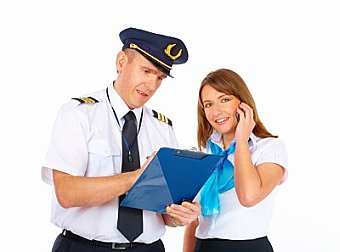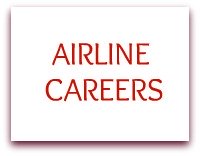Airline Industry Career
Careers and Jobs in Aviation Field
Airline Industry Career - Although flight crews—pilots and flight attendants are the most visible occupations, the vast majority of the industry's employees work in ground occupations. A bachelor's degree is increasingly required or preferred for most pilot and flight attendant jobs. Job prospects generally are better in regional and low-cost carriers than in major airlines, where competition for many jobs is keen. A unique benefit—free or reduced-fare transportation for airline employees and their immediate families attracts many job seekers - According to Bureau of Labor Statistics, U.S. Department of Labor

In general, most airline jobs require a high school diploma. All workers, regardless of their jobs, are given some degree of on-the-job training. Some private technical schools offer courses in airline operations (such as reservations, ticketing, teletypist and flight attendant training). This training may give an applicant an advantage, but remember that each airline has its own training procedures. Therefore, you should check with the airline to which you are applying to find out what pre-employment training it requires.
Airline Industry Career
Airline jobs are located in every city that airlines serve and even in a few they do not serve. Of course, the larger the city, the greater the variety of job opportunities. The largest concentrations of airline career opportunities are in New York, Chicago, St.louis, Los Angeles, San Francisco, Miami, Detroit, Washington,D.C. An applicant may obtain career information by writing directly to the airline. Foreign airlines flying into the United States hire Americans to handle their passenger and air cargo business and to service their aircraft during stopovers. These employment opportunities should not be overlooked. Airline Industry Career
Airline Careers - Flight Dispatcher
In cooperation with the pilot, the Flight Dispatcher furnishes a flight plan that enables the aircraft to arrive at its destination on schedule with the maximum payload and the least operating cost. The Flight Dispatcher considers en route and destination weather, winds aloft, alternate destinations, fuel required, altitudes, and traffic flow. The dispatcher's signature, along with that of the pilot, releases the aircraft for flight. The dispatcher maintains a constant watch on all flights dispatched and is the go-between for the pilot and ground service personnel. He or she keeps all personnel concerned with the flight informed about its status. The dispatcher must be familiar with navigation facilities over airline routes and at airports as well as with the takeoff, cruising, and landing characteristics of all aircraft operated by the airline. The flight dispatcher also must ride periodically in the cockpit with the flight crew to observe flight routes, conditions, and airports.Airline Industry Career
Aviation Meteorologist
The Aviation Meteorologist analyzes weather data and prepares weather reports for the flight dispatcher, pilots, and other airline personnel concerned with weather information. He or she assists the flight dispatcher in preparing flight plans.
Aviation Schedule Coordinator
The Aviation Schedule Coordinator keeps track of the whereabouts of aircraft and crews; receives and relays reports of delays due to weather and mechanical problems; estimates times of arrival; gives orders for substitution of aircraft when required, and handles the scheduling problems that arise when flights must be diverted to alternate airports. The Schedule Coordinator makes decisions affecting the seating arrangements of planes, turnarounds, estimated times of arrival, and unscheduled stops. He or she also determines aircraft availability, based on servicing and maintenance requirements. In scheduling crews, the schedule coordinator must consider many factors: sick calls, vacations, days off, flight hour limits, types of aircraft for which a crew is trained, and seniority bids or choices of flights selected by crew members. Airline Industry Career
Airline Ticket Agents
The Airline Ticket Agents answers inquires about flight schedules and fares, verifies reservations by phone, figures fares, writes tickets, and handles payments. Agents who work at an air terminal ticket counter may check in passengers' baggage. The Ticket Agent is most often the first employee the passenger meets after entering the airport. They assist passengers in:
- Purchasing tickets
- Seat assignment
- Directions to the gate
- Baggage check in
- Other duties very similar to that of the Reservation Sales Agent
The Ticket Agent must be able to lift checked baggage, which can weigh up to one hundred pounds. The Ticket Agent is similar to the Reservation Sales Agent although this is a highly visible position and usually requires a uniform. The ticket counter usually operates 24 hours at the airport, and offers a wide variety of work schedules. Ticket counters are located in every city in which the airline serves. Airline Industry Career
Airline Station Agent
The Airline Station Agent works the arrival and departure gates. This is most often the second employee the passenger meets after entering the airport, and venturing down the concourse. The Station Agent assists the passenger in:
- Additional check-in- requirements
- Seat assignments
- Boarding, arrival, and departure announcements
- Gate-checked baggage
- Answering questions and offering information on airline and airport related topics
The Station Agent is similar to the Ticket Agent, although they do not actually sell tickets. This is also a highly visible position, and usually requires a uniform. The gate area of some airports operates 24 hours, and offers a wide variety of work schedules. The arrival and departure gates are located in the concourse area of every airport that particular airline serves. Airline Industry Career
Airline Industry Career Related Pages

|
|
To the Top
Back from Airline Careers to For Your Dream Career Home Page


